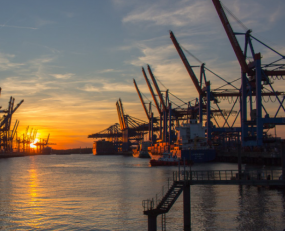
The Suez Canal blockage from March 24 to March 29, following the stranding of the ultra-large container carrier EVER GIVEN caused a bottleneck of almost 400 vessels in both directions. Some of the vessels were bound for Northern Europe ports, the top container ports being Le Havre, Antwerp, Rotterdam, Felixstowe, Bremerhaven and Hamburg.
The Port of Hamburg has said depending on schedules before vessels reach the Port of Hamburg, they stop in other North Range ports. A possible bottleneck in later ports in the rotation will therefore increasingly dissolves. Ships’ routes and schedules are determined by the shipowners. It is also up to them to decide whether they should now depart from regular routes, possibly diverting ships and omitting ports enabling terminals to prepare for condensed arrivals.
The Port of Hamburg handles an average of 25 seagoing vessels each day. With lay times sometimes lasting several days, up to 50 vessels – ULCCs (ultra-large crude carrier), feeders and inland waterway vessels – can be in the port. The port only estimates 15 weekly liner services using the Suez Canal are due to call at the Port of Hamburg with an additional 5-10 vessels – tramp ships – without fixed schedules or routes also due. The measures implemented mean these 25 additional ships are spread over a longer period.
Following the resumption of traffic in the Suez Canal, a deferred peak in calls by ULCCs may be assumed as likely this week (w/c April 19) in the Port of Hamburg. To avoid ‘bottlenecks’, as the traffic control centre for the Port of Hamburg, the Nautical Centre exercises proactive traffic control. A bottleneck could occur on the Elbe, should the port be subject to excessive load, it has been requested for vessels to sail slowly and if required, to anchor in the German Bight.
The HHLA and Eurogate terminals have for some time been operating with ship delays of two weeks – and sometimes considerably longer. The two major terminal operators have now had to contend with this state of affairs for months. The port reported that since the beginning of this year barely a single vessel has reached the Port of Hamburg punctually. This all started in 2020 when production was being boosted again in the Far East/China following the first Coronavirus lockdown and demand for transport capacities rose sharply. Additional factors were unfavourable weather conditions during the winter months, and Brexit at the start of the year. On top of these came the Suez blockage to aggravate the situation – and it is currently impossible to predict precisely to what extent.
Source: Port of Hamburg